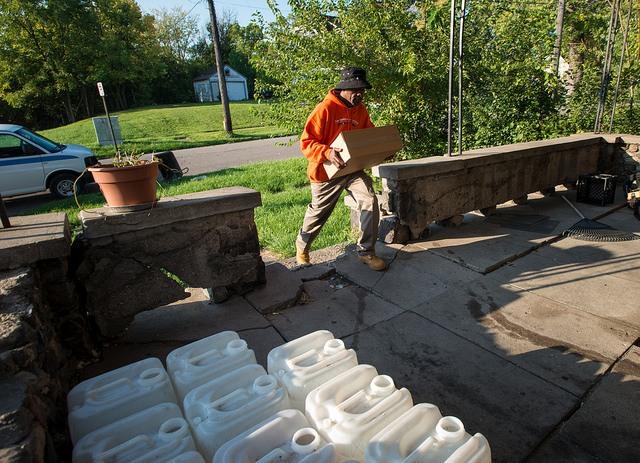
January will be a busy month for water-stricken Flint, Michigan.
The feds will attend a water data summit on Jan. 10 in Chicago hosted by the U.S. Environmental Protection Agency. What exactly is a water data summit, and how does it manually fix century-old lead pipes anyway? No matter, Congress just awarded Flint $170 million to do its repairs, so all that data will be put to good use. Hopefully.
The day after the analysis meeting, the city will hold its own water meeting, presumably to inform listeners as to how it will fix the 3-year-old contamination problem. The meeting was initially open only to invited guests, but the city since decided to open the premises to those most impacted by the water scandal: the public.
Additionally, a group of veterans is coming to Flint, possibly sometime this winter. They will be fresh off the icy plains of North Dakota, where U.S. Army veteran Wesley Clark II and his entourage of some 2,000 veterans spoke up for the civil rights of the Standing Rock Sioux Tribe. The vets are hoping to help train the same kind of attention on the needs of Flint residents, the majority of whom are still surviving off Nestlé bottled water for potable needs.
And Nestlé may find itself back in the news as well. Seems that while the Flint city government was pumping its drinking water from the bowels of the Flint River, Nestlé had a contract to pump Michigan groundwater into its bottles. Some Michiganders are asking why the city of Flint couldn’t have been awarded the same opportunity for the benefit of its residents when it was forced into receivership in 2011. The controversy over Nestlé’s planned expansion has ignited a debate similar to one in Guelph, Ontario, Canada, about public-versus-private rights to public resources.
Meanwhile, environmental and human rights groups are reminding the Michigan and Flint governments that it has effectively been three years since Flint’s water services went offline -- and most residents are still without any idea as to when their pipes will be replaced.
The real problem, of course, is that city officials have no idea either.
Research suggests that cost of replacing the pipes connecting to many Flint homes could actually exceed the value of those homes. To city officials paying the tab, that means something. To the residents now caring for children diagnosed with the permanent effects of lead poisoning, it’s another troubling excuse to fixing a human rights fiasco.
But some progress is happening. According to state estimates, 600 pipes were replaced by the end of 2016. The work is being overseen by former National Guard Brigadier General Michael McDaniel, whose own status may say volumes about the city's realistic view of the project's timeline. The project coordinator worked for the first seven months without pay because the city didn't have the resources to cover his paycheck. A private organization, the Charles Stewart Mott Foundation, stepped in last September to cover the $120,000 yearly salary.
With over 29,000 more city pipes to go, it's anyone's guess when Flint's pipes -- and access to safe, potable water -- will be restored.
The state estimates that, at this rate, it will take until 2067 to replace the rest of the pipes. By that time, Flint's economy may be up and running and able to absorb the other several hundred million dollars officials say it will take to really do the job right.
If there is any bright side to be gained from the Flint water fiasco, it's what it has unwittingly given to the country: a dawning realization that the nation's ailing infrastructure really can't wait much longer.
The Water Infrastructure Improvements for the Nation Act, which President Barack Obama signed into law on Dec. 10, is intended to avert another tragedy like Flint's by solid funding and better planning across the board.
But according to researchers, time may be of the essence: Recent investigations by Reuters suggest that there are "thousands of locales" in the U.S. where children are at even greater risk from lead poisoning than in Flint, either from water or paint-based sources.
America's greatest test case on how to replace a city's vital infrastructure en masse will hopefully offer some road map in coming years about how to fix those unimaginable crises we aren't able to avoid as America's infrastructure grows older.
Image credit: Flickr/USDA
Jan Lee is a former news editor and award-winning editorial writer whose non-fiction and fiction have been published in the U.S., Canada, Mexico, the U.K. and Australia. Her articles and posts can be found on TriplePundit, JustMeans, and her blog, The Multicultural Jew, as well as other publications. She currently splits her residence between the city of Vancouver, British Columbia and the rural farmlands of Idaho.














